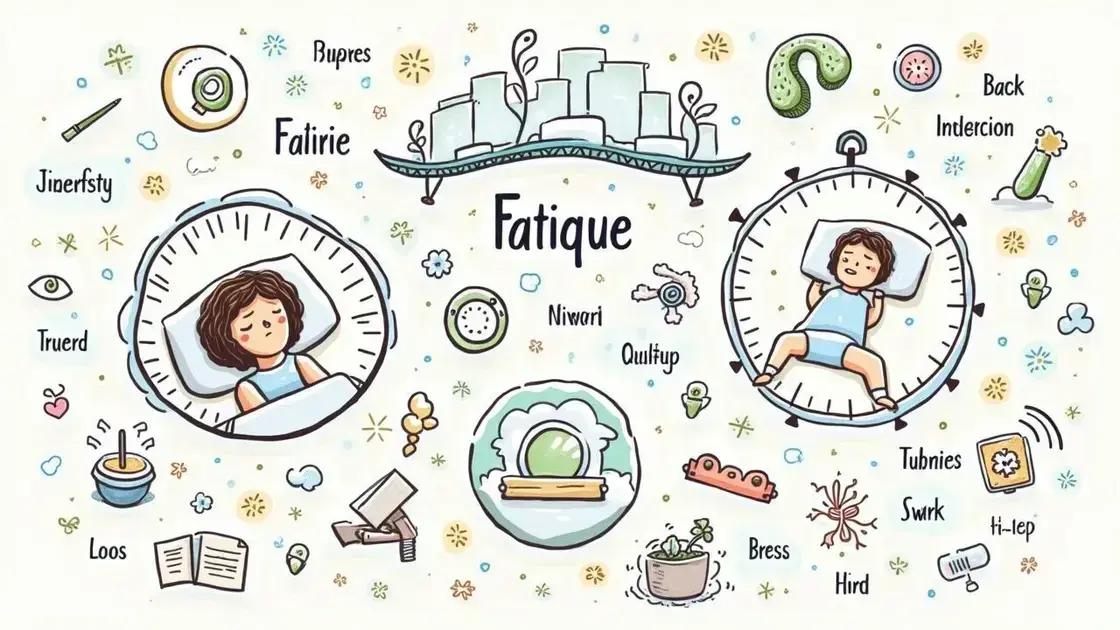To combat fatigue and increase energy levels effectively, focus on proper nutrition with complex carbohydrates and proteins, engage in regular cardiovascular and strength exercises, and practice mindfulness techniques like deep breathing and guided meditation.
Experiencing fatigue can be overwhelming and can significantly affect your daily life. How to combat fatigue and increase energy levels is a question many people ponder. By focusing on key aspects such as nutrition, exercise, and mindfulness, you can discover practical strategies to enhance your vibrancy. This article will guide you through understanding the factors that contribute to fatigue, effective dietary tips, energizing exercise routines, and the impact of mindfulness in increasing energy levels.
Understanding Fatigue: Causes and Effects

Fatigue is a common problem that affects many individuals. Understanding fatigue and its causes is essential for identifying ways to combat it. There are various factors that contribute to fatigue, including physical, emotional, and environmental elements.
Physical Causes of Fatigue
Physical fatigue can stem from inadequate sleep, poor nutrition, or health issues. When your body does not get enough rest, it struggles to regenerate and replenish energy levels. Malnutrition, on the other hand, deprives your body of essential nutrients, leading to decreased energy.
Emotional and Mental Effects
Emotional factors, such as stress, anxiety, and depression, can also lead to feelings of fatigue. The mind directly impacts your energy levels; high-stress situations can leave you feeling drained. It’s important to recognize these emotional aspects as they play a critical role in your overall well-being.
Environmental Influences
Your surroundings can influence your energy levels, too. Factors like noise, lighting, and even air quality can contribute to feelings of fatigue. A cluttered or disorganized workspace can also detract from your focus, further increasing tiredness.
Identifying the Effects of Fatigue
Recognizing the effects of fatigue is crucial. Symptoms may include difficulty concentrating, irritability, and a lack of motivation. Left unaddressed, fatigue can lead to more serious health issues, impacting both physical and mental health.
Nutrition Tips to Boost Your Energy

Nutrition plays a crucial role in boosting your energy levels. By choosing the right foods, you can combat fatigue effectively. Here are some helpful nutrition tips to boost your energy.
Incorporate Complex Carbohydrates
Complex carbohydrates are excellent for providing a steady release of energy. Whole grains like brown rice, quinoa, and oats are great choices. They contain fiber, which helps maintain energy levels without causing spikes in blood sugar.
Focus on Protein
Including protein in your meals can keep you feeling full and energized. Good sources of protein are lean meats, fish, beans, and nuts. These foods help repair muscles and provide lasting energy throughout the day.
Stay Hydrated
Dehydration can lead to feelings of fatigue. Drinking enough water is vital for maintaining energy levels. Aim for at least 8 cups of water a day, and consider drinking herbal teas for added hydration.
Opt for Healthy Snacks
Snacking on healthy foods can help maintain your energy levels between meals. Nuts, fruits, yogurt, and veggies with hummus are nutritious options that provide lasting energy without the crash often caused by sugary snacks.
Exercise Routines for Enhanced Energy

Engaging in regular exercise is a powerful way to enhance your energy levels. Here are some effective exercise routines for enhanced energy.
Cardiovascular Workouts
Cardio exercises, such as jogging, cycling, or swimming, are excellent for boosting your heart rate and improving stamina. Aim for at least 150 minutes of moderate aerobic activity each week. This helps to increase blood flow, delivering more oxygen and nutrients to your muscles.
Strength Training
Incorporating strength training into your routine can also help enhance energy. Focus on bodyweight exercises like push-ups, squats, and lunges. Aim for 2-3 sessions per week, as building muscle boosts your metabolism and overall energy levels.
Flexibility and Yoga
Practicing yoga or stretching can improve flexibility and reduce muscle tension. These exercises promote relaxation and increase circulation. Even 15 minutes of yoga several times a week can help mitigate fatigue and enhance your focus.
Short, High-Intensity Workouts
High-intensity interval training (HIIT) involves short bursts of intense exercise followed by rest. This type of workout is efficient and can be completed in as little as 20-30 minutes. HIIT improves cardiovascular fitness and energy levels quickly.
Mindfulness Practices to Combat Fatigue

Practicing mindfulness can significantly help in combating fatigue. Here are some effective mindfulness practices to combat fatigue.
Deep Breathing Exercises
Deep breathing techniques allow your body to relax and regain focus. Try taking a few moments to inhale deeply through your nose, hold for a few seconds, and exhale through your mouth. Repeat this process several times, and notice how it calms your mind and decreases stress.
Guided Meditation
Listening to guided meditation can help clear your mind and reduce feelings of fatigue. You can find many resources online or through apps that offer sessions ranging from a few minutes to longer durations. Meditation promotes relaxation and restores energy.
Mindful Walking
Walking mindfully combines movement with attention. As you walk, concentrate on each step, the sensations in your legs, and the surrounding environment. This practice can increase your awareness and refresh your mind.
Gratitude Journaling
Writing about things you are grateful for helps shift your focus from fatigue to positive thoughts. Take a few minutes each day to jot down three things you appreciate. This simple method boosts your mood and energy.
In Summary: Combatting Fatigue and Boosting Energy
Understanding how to combat fatigue is crucial for anyone looking to increase their energy levels effectively. By recognizing the causes of fatigue, individuals can take actionable steps in their nutrition, exercise routines, and mindfulness practices.
Incorporating complex carbohydrates, protein, and hydration into your diet can significantly enhance energy. Regular exercise, including cardio and strength training, enables your body to function at its best. Additionally, adopting mindfulness techniques like deep breathing and meditation can help alleviate mental fatigue.
Combining these strategies creates a holistic approach to managing fatigue, allowing you to reclaim your energy and live life to the fullest.
FAQ – Frequently Asked Questions about Combatting Fatigue and Increasing Energy
What are some common causes of fatigue?
Common causes of fatigue include lack of sleep, poor nutrition, stress, and sedentary lifestyle.
How can nutrition help boost my energy levels?
Eating a balanced diet rich in complex carbohydrates, proteins, and staying hydrated can significantly enhance your energy levels.
What type of exercise is best for increasing energy?
Cardiovascular exercises, strength training, and high-intensity interval training (HIIT) are excellent for boosting energy.
What mindfulness practices can help combat fatigue?
Mindfulness practices like deep breathing exercises, guided meditation, and gratitude journaling can help manage fatigue and increase energy.
How often should I exercise to maintain high energy levels?
Aim for at least 150 minutes of moderate aerobic exercise each week, along with strength training at least twice a week.
Can hydration influence my energy levels?
Yes, staying properly hydrated is crucial for maintaining optimal energy levels and combating feelings of fatigue.













